This September will be the second anniversary of the opening of TejjelMézzel (which translates as ‘With Milk and Honey’), a Reformed restaurant in Göncruszka. The building on the main street of the village was bought by the Reformed Congregation of Göncruszka in 2015, and Rev. Levente Sohajda has a surprising explanation for the purchase. ‘A Slovak businessman was planning to open a disco here. This was our initial motivation: I would have found it difficult to prepare for Sunday’s sermon while there was music blasting next door,’ explains the pastor, who lives with his family on the parsonage next to the restaurant.
TANGIBLE HISTORY
The interior of the restaurant, which has an undeniably modern façade, features in perfect harmony rural objects and furniture, former roof beams representing the congregation’s past, as well as strategically placed religious references. ‘For centuries, the building was owned by a local Jewish family that had a great relationship with the Reformed congregation,’ says Levente Sohajda of the history of the property, who was interviewed while sitting at a table of the restaurant. This good relationship is exemplified by the fact that the wrought iron gate of the parsonage was a gift from the family in 1912. The family was deported in 1944, and none of them ever returned. The building was nationalized, and was used for decades as a convenience store, which was closed down in the mid-2000s. It stood empty after that, gradually deteriorating over time. At first the congregation had little idea what to use the building for, but they could not put off renovations.
‘This house is three hundred years old, showing serious signs of neglect, the roof, for example, had caved in. We were worried that the stone walls would get wet, and the mud binder keeping the stones together would be washed out, leading to structural cracks, and the whole building would be beyond repair,’ explains the pastor. ‘We had experienced this before with our old Reformed school, which was ruined by a flood. The beams and planks you can see today in the restaurant were salvaged from the old Reformed school, built in 1823. During the demolition, we found a lintel with the inscription: “Built with the grace of God anno 1823.” There and then we decided that we would save all the wood.
Communal
Although it was clear already in 2015 that the building would not serve as a disco, the new, Reformed owners had several ideas on how to utilize the outstanding property and the building on it. The building, which had also been used as a wine shop before, had a large and well-constructed cellar, and during the years of Communism, a two-storey, 100 sq m warehouse was also erected, used as a gas cylinder refill station. ‘We imagined a variety of potential functions.
The property is adjacent to the parsonage, divided by a little creek, and we even started developing a small bio farm,’ says Rev. Sohajda, bringing an example for the property’s potential. But in the end, the congregation went in another direction: they got the dream of opening a community restaurant, which came true in 2020. ‘A significant portion of the renovations, such as replacing the roof, was accomplished by using Reformed funds and manpower, so a lot of congregation members and youngsters’ work went into creating this restaurant. For this reason, we can truly feel this place is our own.’
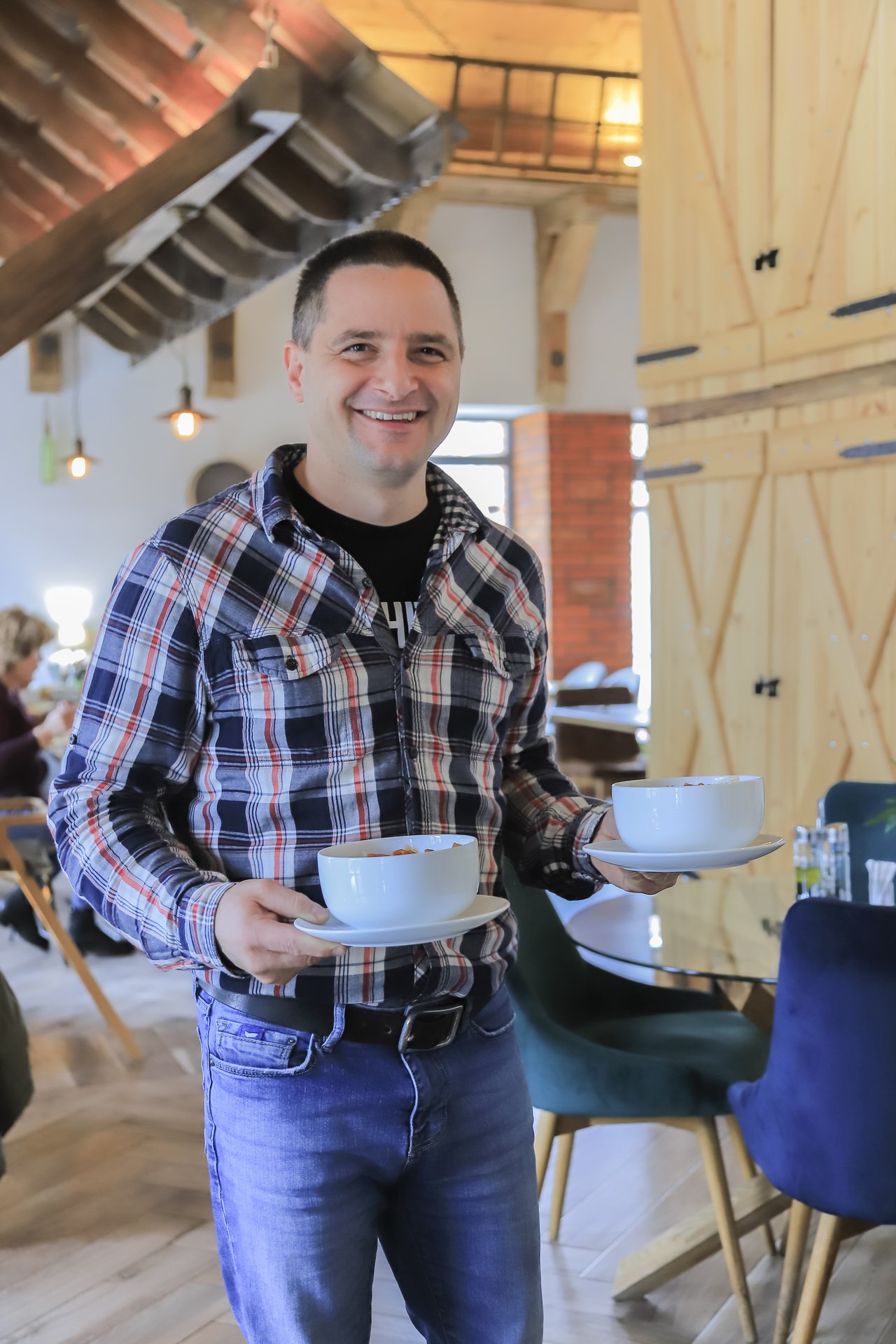
Rev. Levente Sohajda
‘And the same is true for many members of our Swiss and Dutch sister congregations, who, with their expertise and their own two hands, have contributed to the creation of TejjelMézzel. In the end, we needed five years to come to this point,’ says Levente Sohajda, explaining that although nearly two years have passed since the opening, they cannot claim to be ready. ‘A special advantage of community work is that we can feel everything is our own because we ourselves are doing it.
A significant disadvantage, however, is that it is extremely time-consuming, as we cannot just ask people to start on a Monday and not stop until everything is ready. Instead, we can only work when we can find the time. Similarly, we are still learning how to run a restaurant, together we are learning how to cook, wash the dishes and deal with guests. It is a great adventure, but on the other hand there is a lot of tension, which some in our community might find incredibly inspiring, while others get utterly exhausted. This is another thing we have to learn to handle on a congregation level.’
Flowing With Milk and Honey
Apart from being a biblical reference to the land of Canaan, the name of the restaurant carries several meanings, which Rev. Sohajda is happy to reveal. ‘Ten years ago filmmaker András Petrik shot a short film about our community, about the work we do here, and originally it was him who gave the title With Milk and Honey to his film. The sentiment has been resonating in our community ever since, because it refers both to the congregation’s bee yard where honey is produced, and to the inheritance the Lord has prepared for His people.
We were hoping to open a door to those who might not necessarily be willing to enter a church, to share the good news in a perhaps unusual, but easily palatable way,’ says the pastor. ‘This building is located on the main street of the village, which is a popular hiker route, visited by a hundred thousand tourists each year. There are three castles nearby (Füzér, Boldogkőváralja, Regéc), Vizsoly is a famous neighbouring village, and several hiker routes lead through Göncruszka,’ he explains.
‘With the name of the restaurant, we would like to point to a world that exists. For us it is only natural that the Kingdom of God is real, but we have been tasked with showing this world to those who don’t find this reality so obvious because it is not tangible.’ We can see this mission goal in the wooden carved tablets on the façade of the restaurant, each of which features an image from the Gospel of John. ‘We carved Jesus’ “I am” declarations so that every visitor would know that it is not be accident that Jesus introduces himself to the world in the following way: I am the good shepherd, the light of the world.’
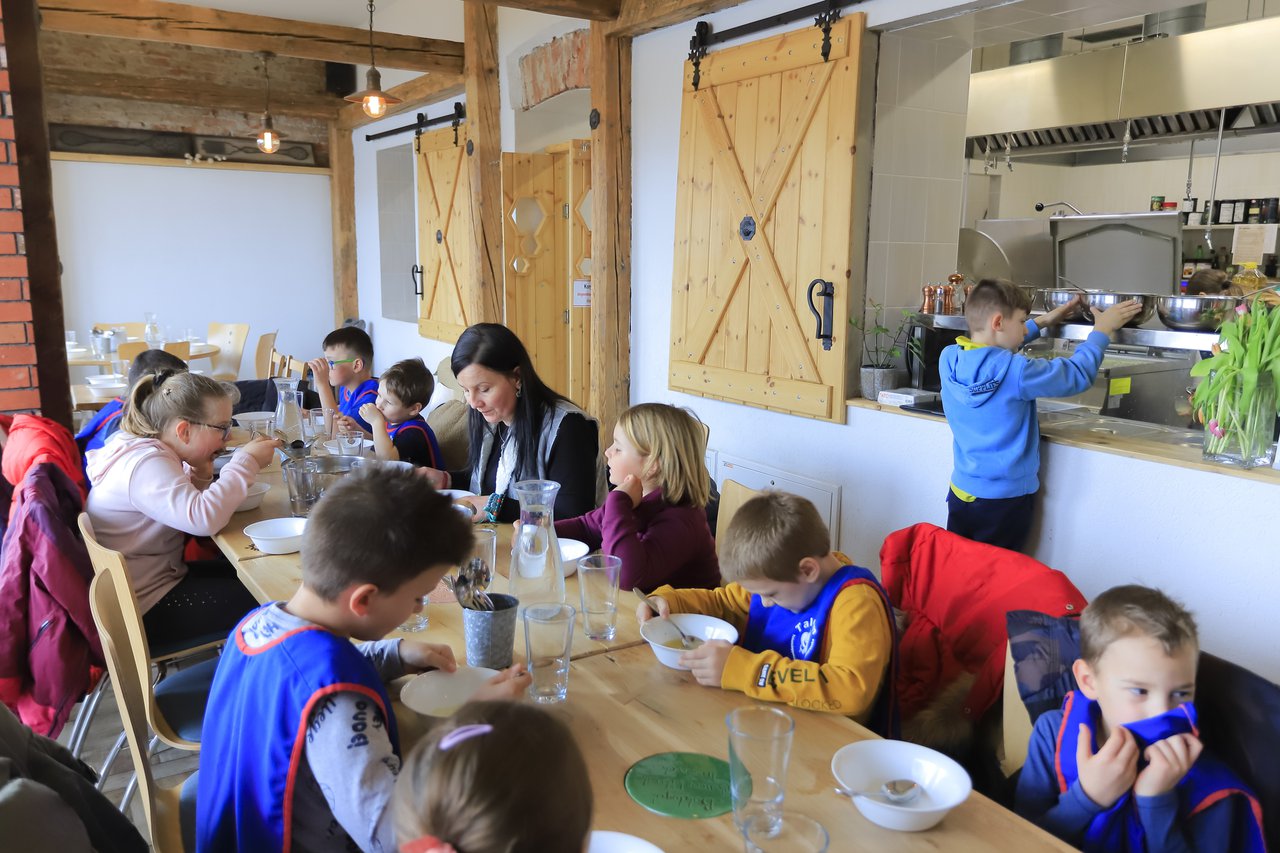
“With the name of the restaurant, we would like to point to a world that exists.”
SCRIPTURE TO GO WITH LUNCH
It is not just those that are provided with spiritual nourishment (as well) who eat their meal in the restaurant, but also those who order takeaway. ‘If you order a daily menu option and opt for takeaway, you get the food in containers that are tied with a Scripture ribbon and the depict the logo of the restaurant as well,’ Rev. Sohajda reveals. The ribbons feature the daily Scripture according to the Hungarian Bible Reading Guide. Apart from printing these every morning, the restaurant employees also have a few quiet moments to think about the day’s biblical verse, so that during the day they can experience it in the kitchen and around the table, as well as in front of the guests. ‘When we first started this practice, many were taken by surprise.
Those who order on a regular basis have since then got used to receiving the biblical message, and even make note if the daily Scripture is missing because of some printing difficulty on our part. Such feedback is nice to get, because if there is even one person who looks forward to not only the food but also the biblical verse, then our mission has fulfilled its aim,’ says the pastor.
Even if you eat the daily menu option in the restaurant or order à la carte, you are not left without a scriptural message. Each of the wooden restaurant tabletops – made from wild cherry, wild pear and chestnut trees collected from the nearby Borsó Hill, the work of one of the congregation’s elders and his son – feature a colourful, round ceramic plate, which all have biblical verses painted on them. The ceramic plates are removable, so their message is always relevant to the current time of the church year. They have become so popular that now they are produced for sale as well, to discourage guests from taking home the ones on the tabletops.
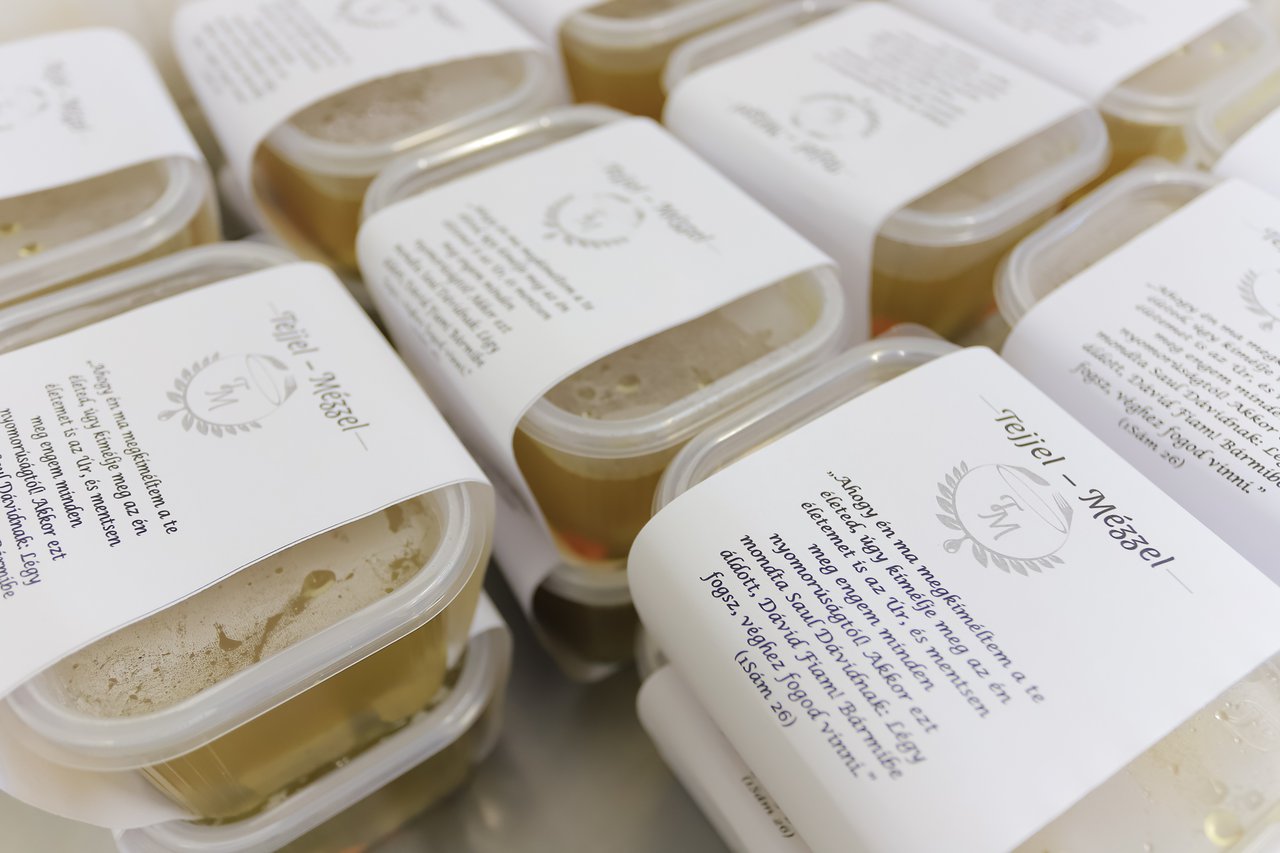
Biblical references to go with lunch
Table Fellowship
While we are talking, schoolchildren walk by the restaurant windows in neat order, enter the restaurant and sit down at a long table to have lunch. ‘Every day, about 400-450 portions are cooked in the restaurant kitchen, the majority of which is consumed by the 230 children who attend the congregation’s kindergarten and elementary school,’ the pastor reveals. ‘The primary aim of opening the restaurant was to allow us to feed these children ourselves,’ he adds. This kind of communal eating is also a reflection of a pedagogical attitude. ‘Each school subject, be it Maths or English, is very important, but religious life also has aspects which cannot be taught in a classroom setting, which has to simply be experienced, and one such aspect is table community.’
Children are not allowed to bring any food to the kindergarten or school. ‘Some of them come from a good background, while others do not. That is why all children wear a uniform overcoat, so that they are not differentiated by one wearing Adidas and the other Adios, a cheap knock-off. And that is why it is a basic principle that everyone eats the same food. This is the rule of table community as well. We form a large family, in which we share food with one another.’
The pastor feels that we are living in an age in which the majority of children do not experience table community at home, because they eat in front of the TV, or the family doesn’t sit down to eat together. ‘For this reason we find it important to keep up this practice at school at least. This, however, is not only important for schoolchildren. The congregation also has not re-learn from time to time how to practise table community, which for us, Christians means Scripture community as well. That is why we pray before meals, inviting the person who created this table community in the first place: Jesus Christ.’
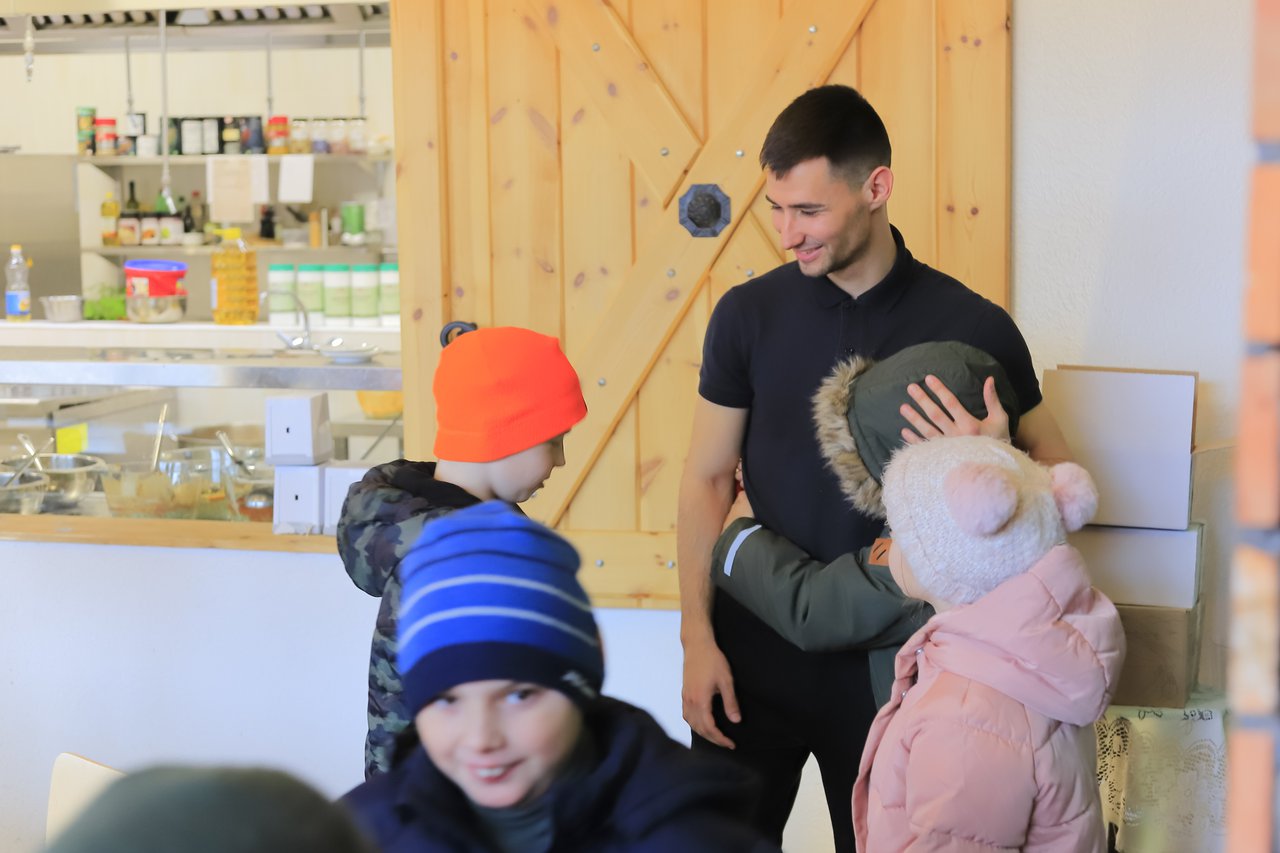
“Schoolchildren’s communal eating is also a reflection of a pedagogical attitude.”
Nonprofit
Levente Sohajda goes on to explain that the restaurant does not aim to be profit-oriented. ‘We simply wanted to provide the children with healthy food on the one hand, and more variety on the other hand, so that they would encounter dishes that they never have at home, or are out of the price range of today’s Hungarian mass catering. It was clear from the outset that we would only be able to provide quality meals and promote a healthy way of eating if we reach beyond the daily 375 HUF (approx. 1 EUR) per person state subsidy.’
This is made possible by the congregation’s own bee yard and bee production plant. To be more precise, the bee yard and bee production plant is owned by the congregation’s nonprofit company, because legal limitations prevent the congregation from running a business. ‘Eventually, we realized what a blessing it is that piety and business are separated within the congregation,’ admits Rev. Sohajda.
The nonprofit company was the founder of Talentum Reformed Talent Development Elementary School and of Talentum Reformed Kindergarten, and it also owns the bee yard, which brings in enough profits for the running of the restaurant, and provides the financial backing for a bursary programme, which supports the further studies of former Reformed elementary school children in need. ‘We knew from the start that the kindergarten and school catering business would operate with a loss, so we included the option of a daily menu as well as an à la carte menu for local farmers, workers and visiting tourists, so that the profit made this way would offset the loss produced by mass catering,’ says the pastor. The long-term goal is for the restaurant to become self-sufficient.
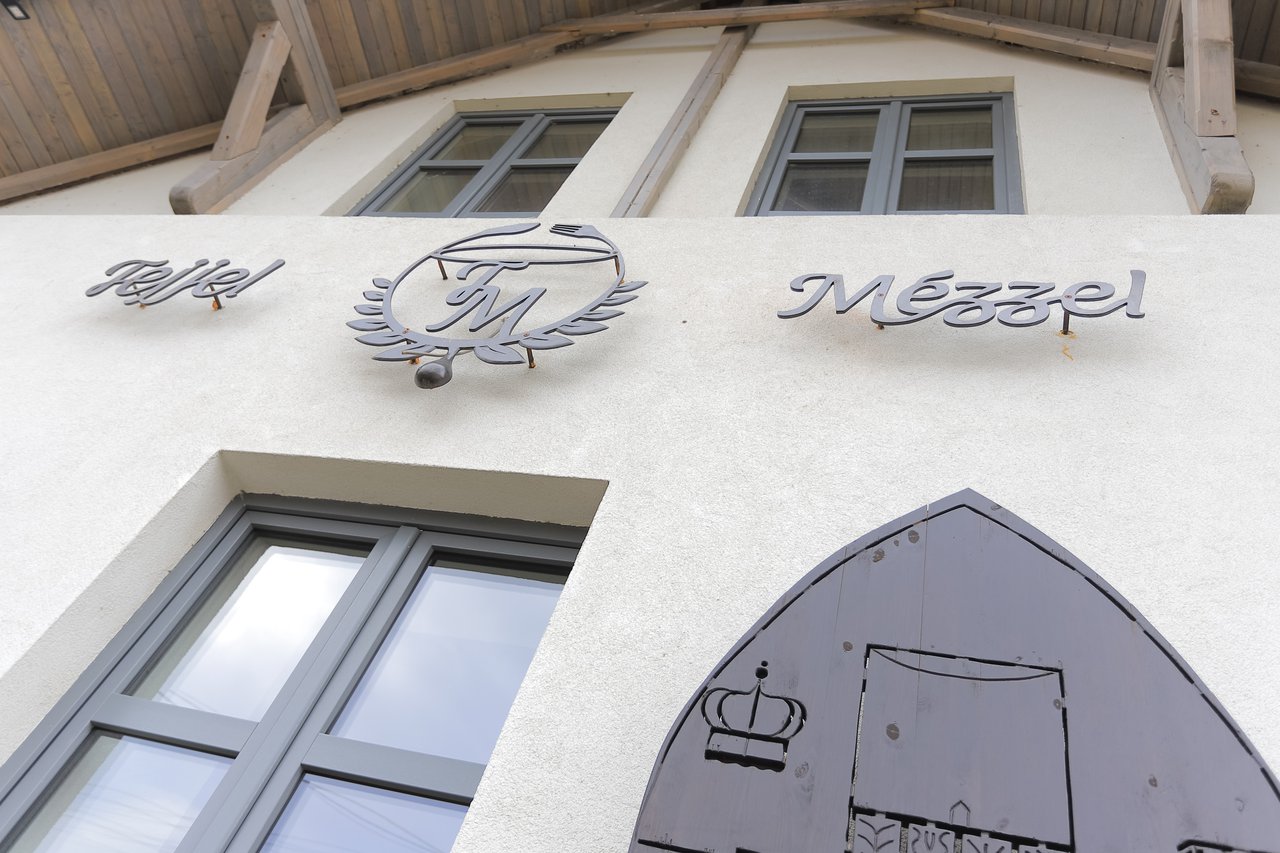
The building is also used for worship services during certain times of the year
TOURISTS ANYWHERE
Self-sufficiency could never be achieved without the hungry tourists who arrive on foot, by bike or car during their excursion in the Zemplén Mountains, and stop by for lunch in TejjelMézzel. Such hopes, however, were crushed by COVID-19; the restaurant opening almost coincided with the outbreak of the pandemic, and tourism plunged as a result of government restrictions.
Naturally, as soon as the pandemic relented and there was a greater freedom of movement, tourists started showing up in the restaurant. Despite the fact that there were no advertisements in the first year, tourists slowly discovered the place for themselves, and there have been Saturday afternoons when all the tables were taken. The restaurant is open all year round from Monday to Saturday, but Sundays are always reserved for the congregation, because the building is also used for worship services during certain times of the year.
Mission
'TejjelMézzel' apart from being the kitchen for the Reformed education institutions of Göncruszka, as well as the only local restaurant, where locals and tourists alike can dine in, is also a mission centre. A place where guests can encounter the Word of God in an indirect way. ‘This place attracts people who would not enter a church or congregation hall. They sit down at the tables that feature scriptural verses. Some are critical and do not understand why the waiter greets them with the traditional Reformed saying “Áldás, békesség” (which means Blessing, peace), but this is a good opportunity to talk with humour and heavenly optimism about ourselves, and above all, about the love of God.
It is a great gift in and of itself that we have a channel where people come in on their own volition, and we don’t have to initiate. Of course, mistakes can still be made,’ says the pastor, who, for this reason, feels it is important to be conscious of who they are. ‘We must bear in mind that we are Reformed Christian citizens here in Göncruszka, we must remember who we belong to and know exactly what we wish to give to our guests both physically and spiritually. If we have uncertainties in this regard, our intentions can go wrong.
If we are incongruous, we will not be seen as authentic at all. Whatever we do, it is not about us. If we make a mistake, it is not just us that will be judged, but the congregation, and ultimately Christianity and the Lord. It is with this responsibility that we must pray every morning to ask for the Spirit of strength and love to let, despite all of our human faults and failures, the Kingdom of God shine among us.
Originally published in Reformátusok Lapja, the weekly magazine of RCH. Translated by Erzsébet Bölcskei.
Honey Can Move Mountains
Christians never fight for causes which are completely lost, since with their faith in God they can change the world. This story is about the creativity of a community surrounded by hopelessness in Northeastern Hungary.